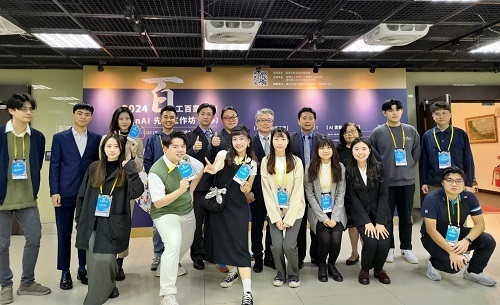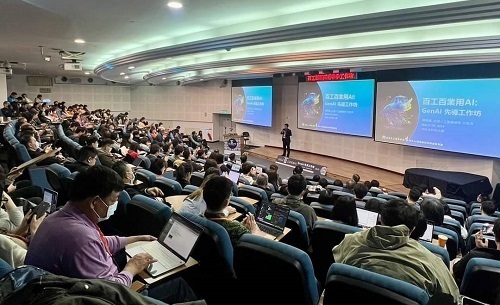2024 Taiwan Toward a New Era of AI
ChatGPT is driving the Generative Artificial Intelligence (GenAI) trend, and the progress of applications has repeatedly broken through imagination, and has become an important driving force for innovation and productivity enhancement in various industries. In order to catch on, under the support of the NSTC's $100 million Pilot Project to Promote the Introduction of Generative AI in Various Industries, the School of Management of Taipei Tech(NTUT) and Taiwan AI Academy co-organized the "AI for All Industries: GenAI Pilot Workshop," which was co-organized with the College of Innovative Studies at National Chengchi University (NCCU) and the Centre for Innovative Democracy (CID).
The GenAI Pilot Workshop was held on March 21st at the Taipei Tech, attracting professionals from various industries, as well as teachers and students from various universities and colleges to participate in the workshop, which aims to cultivate the participants' application and practical skills in generative AI. In the introductory course of the workshop on AI literacy, the organizer specially invited several well-known experts in the field to share their insights and experiences on generative AI.
Prof. Li-wei Yang of National Taiwan University unveiled the principles and application techniques of generative AI in his talk titled "Generative AI You Can't Afford Not to Know"; Deputy Director Cheng-Lin, Tsai of the Taiwan School of Artificial Intelligence demonstrated how these innovative technologies can be applied to daily work and the creative process through the topic of "Generative AI Tool Applications".
In the talk "Digital Transformation meets Generative AI", Prof. Jung-Hsien Chiang of National Cheng Kung University revealed the great potential of combining digital transformation with generative AI, and emphasized how companies can utilize these technologies to stay competitive in the current fast-changing business environment; Prof. I-Chih Li of NCCU explored how generative AI can open up new possibilities in the arts and creative industries through "AIGC's Path to Creative Aesthetics".
In addition, Prof. Mu-En Wu and Prof. Chien-Ping Chung from the Department of Finance and Economics of NTUT led three groups of student teams to share their GenAI practical cases, including the application of insurance and loan fraud prevention, assisting insurance business assistants, and stock market information query and application, etc., which not only demonstrated the combination of theory and practice, but also stimulated the participants to think about possible innovations in the industrial applications in the future.
The team of Dr. Li-Chun Lin, CEO of the CID, NCCU, led the hands-on part of the workshop and the introduction of digital tools, which further deepened the participants' understanding of how generative AI can be transformed into real productivity. Finally, in order to gain a deeper understanding of the participants' backgrounds and needs for generative AI introduction, Prof. Nien-Chi Liu's team at NTU conducted industry survey interviews and collected questionnaire feedback. This not only helps to understand the current situation and pain points of each industry on the introduction of Generative AI, but also provides valuable information on how to introduce Generative AI into these industries in the future, which can be used as a reference for the government's future administration.
Prof. Hsien-Ming Lien of NCCU, who is also the program moderator, pointed out that the impact of the introduction of generative AI on various industries is very significant, especially on specific industries that do not have or lack information capabilities. The main purpose of this workshop is to help them by providing them with basic and immediately applicable generative AI tools to minimize the impact on these industries.
Mr. Ming-Shun Tsai, president of Taiwan School of Artificial Intelligence, also pointed out that the course design of this workshop hopes to focus on the industry players who have less background knowledge of AI in various industries, and to assist them in thinking of future innovative applications in the industry from the basic literacy of AI, the use of tools, and the integration of scenarios and case studies, as well as to collect their feedbacks through questionnaires.
Dean Shu-Kai Fan of the College of Management of Taipei Tech, who is the organizer, pointed out that since March last year, the College of Management of Taipei Tech has been actively introducing generative AI. From the "ChatGPT Workshop" jointly organized with Microsoft Taiwan, to the subsequent "Generative AI Cross-domain Application Forum", followed by the establishment of the "Artificial Intelligence Enabling Cross-domain Micro-programs", and this year, it is also with NCCU, NTU, NCKU, and the Taiwan Artificial Intelligence Academy to undertake the implementation of the National Science and Technology Council's billion-dollar Generative AI into the 100 industry project. In the future, the Academy will move towards the goal of popularizing GenAI in industry and academia as well as in education, and plans to cultivate GenAI application and R&D talents that can be used in all industries.
Through this workshop, participants not only gained insights into the innovative applications of generative AI technology across various industries and its profound impact on the future of work, but more importantly, they envisioned the limitless possibilities of leveraging this technology in their own future endeavors and innovations. This set a new milestone for Taiwan's industrial intelligence transformation and technological innovation, further promoting the widespread application of generative AI technology across numerous fields.


Chinese Resource:https://money.udn.com/money/amp/story/5723/7852257